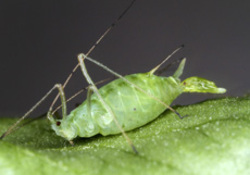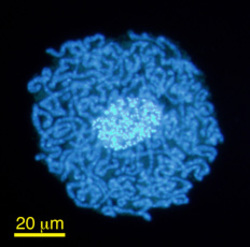
Nakabachi, Atsushi
| Affiliation | Research Center for Agrotechnology and Biotechnology |
|---|---|
| Concurrent post | Department of Applied chemistry and Life Science |
| Title | Associate Professor |
| Fields of Research | Biology of Symbiosis, Entomology, Microbiology |
| Degree | Ph.D. (The University of Tokyo) |
| Academic Societies | Society of Genome Microbiology, Japan; The Japanese Society of Microbial Ecology; The Japanese Society of Applied Entomology and Zoology; The Zoological Society of Japan; Society of Evolutionary Studies, Japan; American Society for Microbiology |
| nakabachi.atsushi.ro@ Please append "tut.jp" to the end of the address above. |
|
| Laboratory website URL | http://www.eiiris.tut.ac.jp/nakabachi.html |
| Researcher information URL(researchmap) | Researcher information |
Research
Our research interests focus on the molecular basis for the symbiosis between multicellular organisms and microbes. This symbiosis, which has played critical roles in the evolutionary history of life, also holds significant potential for agricultural and medical biotechnologies.
Theme1:Studies on intracellular symbioses of pest insects
Overview
Many insect lineages, including agricultural/medical pests, have mutually indispensable associations with bacterial symbionts localized in specialized cells called bacteriocytes. We are trying to elucidate the molecular mechanisms for developing and maintaining this type of intimate symbiosis.
Selected publications and works
Song C, Maruyama J, Murata K, Suzaki T, Nakabachi A. (2025) Enigmatic tubular ultrastructure in the bacterial defensive symbiont of the Asian citrus psyllid Diaphorina citri. Npj Imaging 3(1):44.
Yasuda Y, Inoue H, Hirose Y, Nakabachi A. (2024) Highly reduced complementary genomes of dual bacterial symbionts in the mulberry psyllid Anomoneura mori. Microbes Environ 39(3):ME24041.
Nakabachi A, Ishida K, Hongoh Y, Ohkuma M, Miyagishima SY. (2014) Aphid gene of bacterial origin encodes a protein transported to an obligate endosymbiont. Curr Biol 24(14): R640-R641.
Nakabachi A, Yamashita A, Toh H, Ishikawa H, Dunbar HE, Moran NA, Hattori M. (2006) The 160-kilobase genome of the bacterial endosymbiont Carsonella. Science 314 (5797): 267.
Nakabachi A, Shigenobu S, Sakazume N, Shiraki T, Hayashizaki Y, Carninci P, Ishikawa H, Kudo T, Fukatsu T. (2005) Transcriptome analysis of the aphid bacteriocyte, the symbiotic host cell that harbors an endocellular mutualistic bacterium, Buchnera. Proc Natl Acad Sci USA 102(15): 5477-82.
Keywords
Theme2:Studies on symbiotic bacteria as genetic resources
Overview
Selected publications and works
Izu T, Uchida N, Takasu R, Nakabachi A. (2025) Antibacterial spectrum of diaphorin, a polyketide produced by a bacterial symbiont of the Asian citrus psyllid. J Invertebr Pathol 211:108309.
Takasu R, Izu T, Nakabachi A. (2024) A limited concentration range of diaphorin, a polyketide produced by a bacterial symbiont of the Asian citrus psyllid, promotes the in vitro gene expression with bacterial ribosomes. Microbiol Spectr 12(7):e0017024.
Tanabe N, Takasu R, Hirose Y, Kamei Y, Kondo M, Nakabachi A. (2022) Diaphorin, a polyketide produced by a bacterial symbiont of the Asian citrus psyllid, inhibits the growth and cell division of Bacillus subtilis but promotes the growth and metabolic activity of Escherichia coli. Microbiol Spectr 10(4):e0175722.
Nakabachi A, Piel J, Malenovský I, Hirose Y. (2020) Comparative genomics underlines multiple roles of Profftella, an obligate symbiont of psyllids: providing toxins, vitamins, and carotenoids. Genome Biol Evol 12(11):1975-1987.
Nakabachi A, Ueoka R, Oshima K, Teta R, Mangoni A, Gurgui M, Oldham NJ, van Echten-Deckert G, Okamura K, Yamamoto K, Inoue H, Ohkuma M, Hongoh Y, Miyagishima SY, Hattori M, Piel J, Fukatsu T. (2013) Defensive bacteriome symbiont with a drastically reduced genome. Curr Biol 23(15): 1478-84.
Keywords
Theme3:Studies on various agriculture-related symbioses
Overview
Agricultural plants have complicated symbiotic relationships with various organisms, including microbes. We have started some research on this knotty issue.
Selected publications and works
Nishino K, Inoue H, Hirose Y, Nakabachi A. (2024) Microbiome of psyllids of the family Aphalaridae, including Aphalara itadori, a biocontrol agent against Reynoutria spp. Entomol Exp Appl 172(11):1033-1045.
Maruyama J, Inoue H, Hirose Y, Nakabachi A. (2023) 16S rRNA gene sequencing of six psyllid species of the family Carsidaridae identified various bacteria including Symbiopectobacterium. Microbes Environ 38(3):ME23045.
Nakabachi A, Inoue H, Hirose Y. (2022) Microbiome analyses of 12 psyllid species of the family Psyllidae identified various bacteria including Fukatsuia and Serratia symbiotica, known as secondary symbionts of aphids. BMC Microbiol 22(1):15
Nakabachi A, Malenovský I, Gjonov I, Hirose Y. (2020) 16S rRNA sequencing detected Profftella, Liberibacter, Wolbachia, and Diplorickettsia from relatives of the Asian citrus psyllid. Microb Ecol 80(2):410-422.
Yamada T, Hamada M, Floreancig P, Nakabachi A. (2019) Diaphorin, a polyketide synthesized by an intracellular symbiont of the Asian citrus psyllid, is potentially harmful for biological control agents. PLoS One 14(5):e0216319.
Dan H, Ikeda N, Fujikami M, Nakabachi A. (2017) Behavior of bacteriome symbionts during transovarial transmission and development of the Asian citrus psyllid. PLoS One 12(12): e0189779.
Keywords
Title of class
Environmental Biotechnology (B14620350)
Advanced Biotechnology 1 (D34030040)
Advanced Technology on Food and Agriculture Science 2 (M24630450)
Topics in Life and Materials Science (S14620430)
Others (Awards, Committees, Board members)
April 2019, Nagase Foundation Award 2019
March 2010, The young scientist award from the Society of Genome Microbiology, Japan



